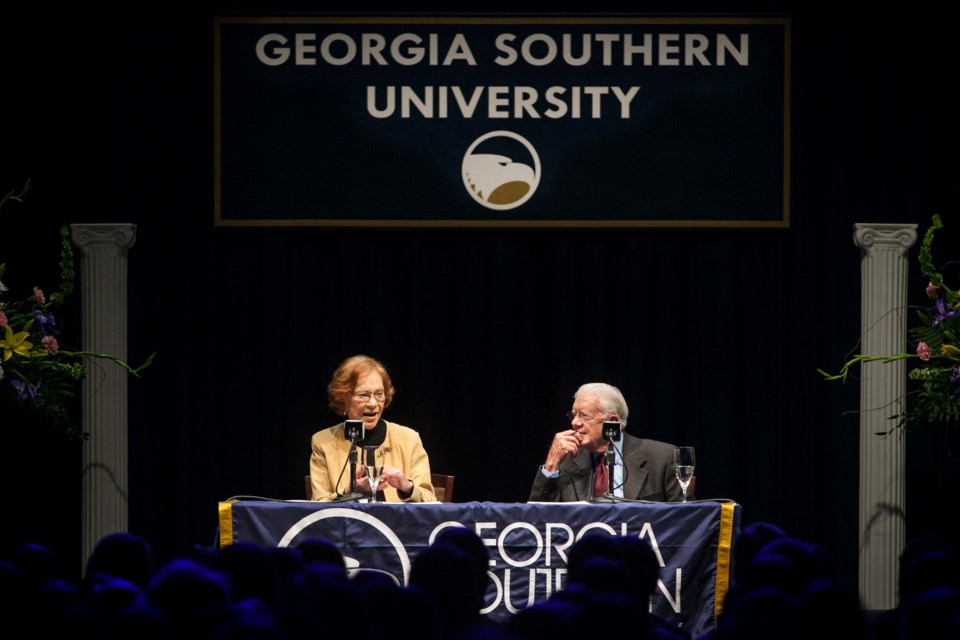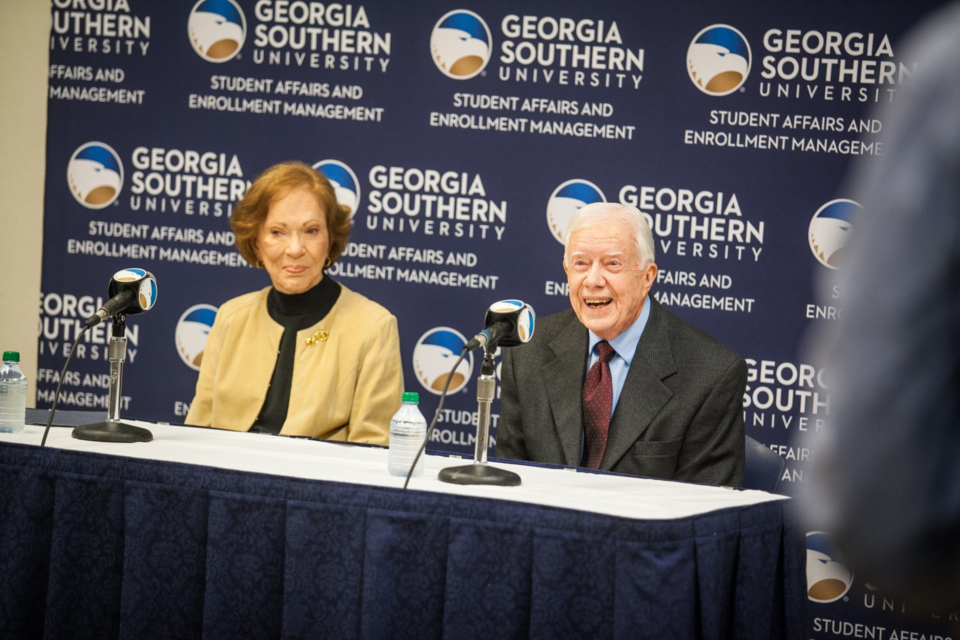Former President Jimmy Carter passed away at the age of 100. Carter served as the 39th president of the United States from 1977 to 1981, and he was also the 76th governor of Georgia, serving from 1971 to 1975. Famous for his international peace initiatives and humanitarian efforts during and after his presidency, he is the only U.S. president to call Georgia “home.”
Chris Caplinger, Ph.D., is an assistant professor within the Department of History at Georgia Southern University and has insight into Carter’s life before, during and after his presidency.
Question: How did you first get introduced to studying the former president?
Caplinger: I was an undergraduate at Emory University. After he left the White House, he held a position on faculty there. He did give individual lectures, but he also did something that really touched almost every incoming student. For a number of years before I was there and then well after I was there, he would be one of the speakers at the new student convocation.
I managed to wrangle an invitation all four years. He did questions and answers afterwards. And so, as a 22-year-old, I stood up in the auditorium and he answered my question. That was a lot of fun.
Question: What are some memories or personality traits that stand out to you about President Carter?
Caplinger: He clearly was oriented toward improving people’s lives. He was always very upfront from his campaign throughout his life talking about issues of his faith, which were an anchor for what it was he was doing. He believed in doing the right thing. His biographers will explain that one way to really get under President Carter’s skin was to say that this was going to look good politically, because it was like questioning the motive of doing something. He was frustrated that it was that way and that people would frame it that way. He was frustrated when he was dealing with people who were aware of the political implications of the things that he was asking them to do. To him it was a matter of you should know better, you should do the right thing.
Question: What was it about Carter that made him so appealing in 1976? Why did America choose the peanut farmer from Georgia?
Caplinger: He was a little bit of a palate cleanser, if you want to think about it. Gerald Ford, who became president when Richard Nixon resigned, had been a popular politician, but he was tarred by the fact that he pardoned Nixon. And that was not very popular at the time.
Carter’s election was sort of a pendulum swing toward somebody who was overtly moral and someone who wore that on his sleeve. He was different, and I think a lot of people voted for him thinking that we needed something different.

Question: Talk about his ability to connect with the American people while he was in office. As you noted, he was a bit of a palate cleanser after the Nixon-Ford administration. What did Carter do to almost reimagine how people think of a presidential administration coming out of Nixon-Ford?
Caplinger: In 1974, he decides to throw his hat into the ring and just camps out in Iowa, which is something that people have done since then. But it was this new thing to invest this much time and energy going to the state fair and all the things that you do in each of Iowa’s 99 counties. He connects and I think he comes across as genuine. So even when he wasn’t known nationally, people in Iowa had been seeing quite a bit of him. He would introduce himself, he would say, “I’m Jimmy Carter and I’m running for president” in his folksy way.
Question: Let’s get into his presidency now. Are there any moments from his presidency that stand out to you more than others?
Caplinger: Some of them were very positive and then others where he was having to react to crises. The oil shocks were big ones that bedeviled his presidency for a while. And then, not unrelated to this, the Iranian Revolution and then the capture of 52 hostages in the embassy in Iran later that year, 1979, came to define the last year of his presidency.
His popularity spikes immediately after the hostages are taken, but then there’s a failed rescue attempt. After that the American populace sees him as a weak leader, whether that’s true or not.
He took some steps to give the Panama Canal back to Panama, and that played well with Latin America by making the United States look like a responsible partner instead of an imperialistic power. However, it didn’t poll well. Carter was initially hesitant to give Panama back. Then-President Gerald Ford had been working toward liberalization of the Panama Canal, but Carter was very lukewarm about it. This is something that I think would help to define Carter. When he came into the office, he had some people who were there to advise him about what had been happening. Pretty quickly, he changed his mind. It’s important to be open to that happening, learning something new and finding out that you need to be going in a different direction, and I think this is what happened to Carter with Panama.
Question: What was Carter’s leadership style during all of this?
Caplinger: The concept of responsibility was always very important to President Carter. When you had the responsibility, that meant you’re going to do something about it. Part of this comes from his training. He believed that you could fix complex problems by studying them. He worked hard. He worked 12-hour days and read a lot, studied a lot, and when he felt like he had a solution, then he would sometimes browbeat Congress in order to get it.
He calls for conservation during his term. He comes to the American people and says we need you to treat this like it’s a big deal. He’s calling on people to sacrifice for the greater good. However, Americans generally don’t like to do that for long periods of time.
Gasoline rationing takes place in World War II and it’s somewhat successful. The difference was that people understood during World War II what the costs were. They understood why they were being called to do it. Famously in the 70’s, lots of people thought that the oil crisis was manufactured by oil companies. So part of it was that they just didn’t necessarily believe it.
The issue of gasoline rationing for Carter was actually Congress. It was seen to be the responsible thing: we need a plan because if there was a serious oil shock, there could just be bedlam at the gas pump. If there’s no plan, it would be extremely disruptive. So the idea was that you have a plan in place, not because anybody wants it; nobody wants it.
The issue with gasoline rationing is that there are winners and losers. At some level, Carter understood that and he was willing to let Congress figure out a plan. Congress was not able to do it; it was not able to make it happen. And when Congress fails in doing it, Carter gets out his wagging finger and chastises them for not thinking of the nation before their locale.
Question: Let’s discuss his post-presidency now. Can you talk a little bit about how his personality style became so productive, and what do you think drove him to continue making these impacts after the White House?
Caplinger: He was by far the longest ex-president that we’ve had. I do think it’s important to see a lot of what he was doing as a continuation of things that he started, in many cases in the White House
If you take a look at his work with elections, an outgrowth of peace initiatives, and other priorities, he’s able to be successful in a lot of these efforts because of the priorities that he had in the White House. The mechanism for this is the Carter Center. It’s his presidential library, but it’s also a form of think tank. It’s this very, very active place that is working on the things that Carter valued. So he was, I think, seen as an honest broker.
Question: When it comes to being in the White House, a lot of the job is learning how to do it on the fly. If you could sum up the biggest lesson on how to be president that we learned from President Carter, what do you think that lesson would be?
Caplinger: There’s a lot of cautionary tales of what not to do. We learned you don’t get to just govern; you have to build allies. I do think that a good relationship with Congress is something that is essential. You’ve got to have a good team that knows how to do that.
On the positive side, Carter is responsible for getting the United States behind human rights as being a defining part of what foreign policy should be. I think that’s a good message to lead by.
To listen to Caplinger’s full conversation on President Carter’s life and legacy, follow this link to an episode of Eagle Eye View.




